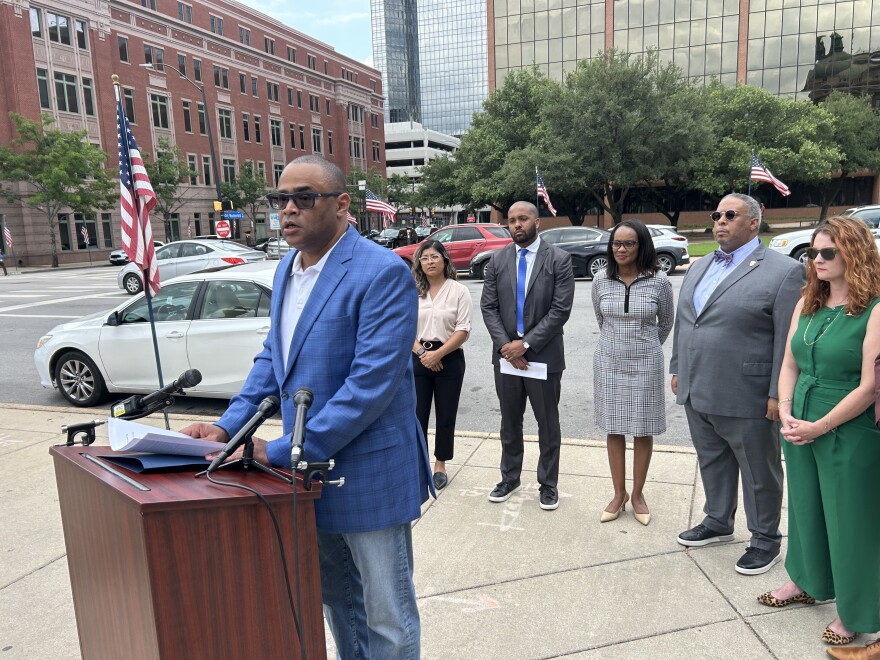Tarrant County Democratic leaders at the national and local level gathered Tuesday to denounce the county’s redistricting attempt, which would make Democratic County Commissioner Alisa Simmons’ precinct more Republican-friendly before she’s up for reelection next year, past election data shared by the county shows.
U.S. Congressman Marc Veasey appeared alongside Simmons, her fellow Democratic County Commissioner Roderick Miles Jr., and members of the Fort Worth City Council at a press conference outside the historic Tarrant County Courthouse in downtown Fort Worth. Veasey said the redistricting effort, led by Republican County Judge Tim O’Hare, targets the county’s growing Black and Hispanic communities.
“We're not going to be silenced, we're not going to be erased, and we're not going to let them drag us back into Jim Crow politics," Veasey said.
KERA News reached out to O’Hare for comment and will update this story with any response.
This unusual mid-decade redistricting process started in April, when the Republican majority on the Tarrant County Commissioners Court voted to hire a conservative law firm to redraw the commissioners court precinct lines. All the commissioners represent one of four geographic precincts, except O’Hare, who represents the whole county.
Miles and Simmons — the two Democrats on the court — have denounced the process as racial gerrymandering. The proposed maps would strip voters of color from Simmons’ Precinct 2 in southeastern Tarrant County and pack them into a reshaped version of Miles’ Precinct 1, they say.

Republicans in favor of redistricting have denied it’s about race — it's about politics.
Commissioners Matt Krause and Manny Ramirez have both said they want redistricting to give their party the advantage. Growing the existing Republican majority on the commissioners court, from three members to four, will help Tarrant County avoid problems seen in Democrat-led counties, like high taxes, Ramirez wrote in a Fort Worth Star-Telegram opinion piece.
Opponents of redistricting use race as a tool, Krause told a packed public hearing in Hurst last week.
“The Supreme Court's not gonna step in if it's a partisan gerrymander,” he said. “That's why you have to allege that racial component, because that's the only way you can ever get into court to find relief, whether there's any basis to it at all."

Krause said no maps from the 2021 statewide redistricting process have been changed because of racial issues, but contested districts are still working their way through the courts.
This month, a three-member panel of U.S. district judges in El Paso will hear cases alleging some of the new congressional and state legislative maps dilute Black and Latino voting power, The Texas Tribune reported. That includes some districts in Tarrant and Dallas counties.
Politicians usually redraw maps every 10 years, after the U.S. Census, to make sure districts are relatively balanced by population. But experts say the process is always hyper-political, and both parties use it to their advantage. Harris County commissioners adopted a Democrat-friendly map during their redistricting process in 2021.
A previous set of Tarrant County commissioners decided to leave the precinct map the same after the 2020 Census, because data showed the precincts were balanced by population.
The new proposed maps rely on the same data, said Fort Worth City Council member Jeanette Martinez, who also works for Commissioner Roderick Miles Jr.
“Think about it this way,” she said. “If your health was on the line, would you rely on data that's five years old? You would not.”
The council voted along party lines last week to pass a resolution opposing redistricting. Fort Worth Mayor Mattie Parker voted against that resolution but added her name to a letter signed by nine other Tarrant County mayors urging the county to rethink redistricting.
The proposed maps are based on outdated Census data, don’t meet state legal standards and may be racially discriminatory, the letter argues.
A vote on the proposed maps is expected at the Tarrant County Commissioners Court meeting on June 3. If one of them is adopted, the county can expect legal action, Veasey said.
Got a tip? Email Miranda Suarez at msuarez@kera.org.
KERA News is made possible through the generosity of our members. If you find this reporting valuable, consider making a tax-deductible gift today. Thank you.





